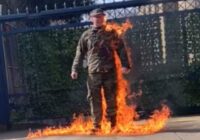Pavel Shevchenko (not his real name) lost his leg and his eyesight fighting for Ukraine’s freedom. Remarkably, he shows no self-pity. “I’m not the only one this kind of thing has happened to,” he told me. “Stuff happens, and I don’t see this as unfair.” He’s at least mostly at peace with the idea that his sacrifice was made to help keep a genocidal invader from taking over his homeland.
Pavel’s mother, Anna Shevchenko, is a different case. She now has to deal with the fact that her son is a blind man with a prosthetic leg. Compounding her grief, she’s also recently lost another close family member. However, she’s been so caught up in helping with her son’s rehab that she barely has time to process the second loss. This makes the trauma complex and difficult to heal.
Anna isn’t doing well. She needed the help of Svitlana Kutsenko, a clinical psychologist. Kutsenko works at Super Humans, the most advanced prosthetics hospital in Ukraine. She provides treatment to the essential but little-discussed population of patients with psychological trauma.
Psychological trauma of the sort that Anna is dealing with comes about when a person witnesses or experiences extremely stressful, disturbing or traumatic events. People who have psychological trauma may have symptoms such as intense feelings of sadness, despair, anger, guilt or fatigue. They may have nightmares, flashbacks or difficulty concentrating.
Tragically, Russia’s war on Ukraine has caused uncountable new instances of psychological trauma.
How does a clinical psychologist help victims of psychological trauma?
To see the kind of help a clinical psychologist like Kutsenko can provide, let’s look at how she’s helping Anna.
“When I have a new patient,” Kutsenko told me, “often the symptoms that I hear might begin with, ‘Help me, I can’t sleep,’ or, ‘I can’t communicate with other people because I get angry too easily.’”
A session might start with these kinds of symptoms, but soon enough she and her patient get into much more complex issues, ones that are closer to a person’s identity, such as, “Why is this happening? Why did they do this to me?”
To Kusenko, these latter kinds of questions are often the ones that matter most. “People get suicidal when their lives don’t have meaning. We find that suicidal thoughts come because of questions of meaning, not because the individual is more anxious than usual.”
Anna is feeling powerless and in despair. “Sometimes the best I can do for her,” acknowledges Kusenko, “is say to her, ‘What you’re going through is a nightmare. You have the right to be in the mental state you’re in right now. What you’re feeling is a normal reaction to totally abnormal circumstances. No human being should have to face this kind of challenge.’”
Kutsenko can’t make the mother’s pain go away, but she can listen to her, be there for her and validate what she’s feeling. She can also rejoice with her when Pavel passes a milestone in his healing, such as being able to take his first steps with his prosthetic leg.
Kutsenko’s goal is not only to help mitigate Anna’s immediate pain, but also to help her move to a place where the scars will not control her life. Kutsenko knows that Pavel’s resilience in the face of his severe injuries is heroic, yet it is Anna who embodies the silent, enduring agony of a caregiver who must witness her child’s suffering daily.
Anna’s battles are fought in the shadows of her son’s visible scars. Both Pavel and Anna bear immense burdens, but it is perhaps the unseen wounds of those like Anna, who grapple with the relentless echoes of trauma and loss, that linger longest.
The views expressed in this article are the author’s own and do not necessarily reflect Fair Observer’s editorial policy.
Support Fair Observer
We rely on your support for our independence, diversity and quality.
For more than 10 years, Fair Observer has been free, fair and independent. No billionaire owns us, no advertisers control us. We are a reader-supported nonprofit. Unlike many other publications, we keep our content free for readers regardless of where they live or whether they can afford to pay. We have no paywalls and no ads.
In the post-truth era of fake news, echo chambers and filter bubbles, we publish a plurality of perspectives from around the world. Anyone can publish with us, but everyone goes through a rigorous editorial process. So, you get fact-checked, well-reasoned content instead of noise.
We publish 2,500+ voices from 90+ countries. We also conduct education and training programs
on subjects ranging from digital media and journalism to writing and critical thinking. This
doesn’t come cheap. Servers, editors, trainers and web developers cost
money.
Please consider supporting us on a regular basis as a recurring donor or a
sustaining member.
Will you support FO’s journalism?
We rely on your support for our independence, diversity and quality.







Comment